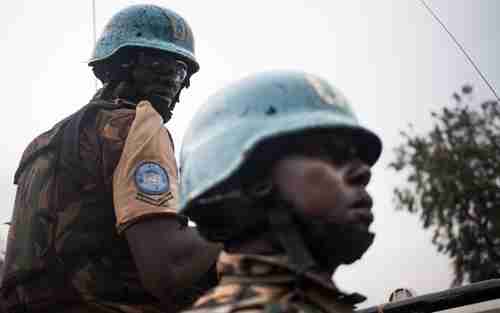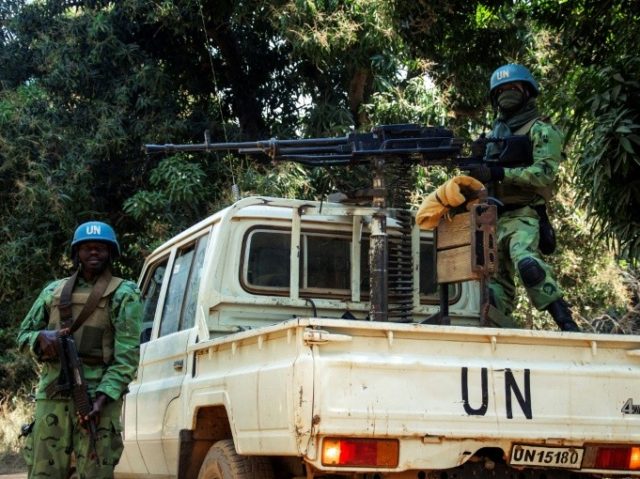This morning’s key headlines from GenerationalDynamics.com
- Over 10,000 people displaced by new fighting in Central African Republic civil war
- Suspicions grow about Russia’s Wagner PMC mercenary group in Central African Republic
Over 10,000 people displaced by new fighting in Central African Republic civil war

Tanzanian soldier in UN blue helmet peacekeeping mission in Central African Republic in July (AFP)
Last week, the town of Batangafo in northern Central African Republic (CAR) was attacked by militias in the ongoing generational crisis civil war. Armed groups looted and burned thousands of homes, three camps hosting 27,000 displaced and a market in the city. Some 10,000 are seeking refuge in a hospital in Batangafo run by Doctors Without Borders Borders (Médecins Sans Frontières, MSF). At the same time, the town of Bambari in central CAR was attacked. Dozens of people were wounded or killed, or had to be treated for burns.
The CAR sectarian war began in March 2013 when François Bozizé, the Christian former president of CAR, was ousted in a coup in March 2013 by Michel Djotodia, a Muslim, who became president and served until January 2014.
After Djotodia’s coup took place, Muslim Séléka militias began committing atrocities, particularly targeting the Christian constituencies of the deposed François Bozizé. In December 2013, French Foreign Legion peacekeeping troops arrived to disarm the Séléka militias.
The actions of the French troops backfired. When the Muslim Séléka troops were disarmed, the Christian anti-balaka militias “rushed into the vacuum,” and began committing atrocities in 2014 for revenge against the Sélékas. Since then, both Christians and Muslims have been committing atrocities, and it has become a full-scale generational crisis war. Thousands have been killed and millions displaced.
Since 2013, there has been a struggle led by the United Nations Security Council to use “peacekeepers” to bring the fighting to an end.
In 2015, there was even a visit by Pope Francis to CAR’s capital city Bangui to propose “a renewed attention to the idea of a respectful urban integration, as opposed to elimination, paternalism, indifference or mere containment.” ( “28-Nov-15 World View — Pope Francis to visit Central African Republic in middle of civil war”)
A generational crisis war only ends when everybody is completely exhausted, and then only with an “explosive climax,” usually an act of genocide that is so horrific that both sides agree to end the war and vow never to allow anything like that to happen again. The war in CAR is nowhere near such an explosive climax.
Jonathan Allen, UK’s UN ambassador, recently said the following at a UN Security Council meeting:
Civilians, peacekeepers, and humanitarian workers continue to be attacked. More than one in four Central Africans remain displaced; half of the population are in desperate need of humanitarian assistance. Only 36% of the 2018 Humanitarian Response Plan has been funded. We encourage all member states to help fill this gap. The UK has provided £63 million – or $81 million – in humanitarian aid to CAR since 2015. We believe that this aid supports progress towards a stable, secure, and peaceful CAR – something that remains in all of our interests.
From the point of Generational Dynamics, CAR’s last generational crisis war was the 1928-1931 Kongo-Wara Rebellion (“War of the Hoe Handle”), which was a very long time ago, putting CAR today deep into a generational Crisis era with a new crisis war in progress.
This war was triggered by a religious fault line between Muslims and Christians, but it is actually an ethnic war between cattle herders, such as ethnic Fulani, versus farmers, such as ethnic Gula and Runga. As I have described many times in Central African Republic, Nigeria, Rwanda, Burundi, Kenya, Sudan, South Sudan, and even America in the 1800s, is that in country after country, there is a classic and recurring battle between herders and farmers. The farmers accuse the herders of letting the cattle eat their crops, while the herders accuse the farmers of planting on land that is meant for grazing. If the farmers put up fences, then the herders knock them down. ReliefWeb (1-Nov) and Médecins Sans Frontières and Reuters and UK Government
Suspicions grow about Russia’s Wagner PMC mercenary group in Central African Republic
In July, three internationally known reporters and war correspondents were gunned down and killed in Central African Republic after their car was ambushed.
The three were making a documentary film for TsUR, an investigative media center funded by Mikhail Khodorkovsky, a Russian oligarch. In 2003, Khodorkovsky announced he would run against Vladimir Putin for president. Putin destroyed Khodorkovsky and had him jailed for life, only letting him out in 2013 in a “humanitarian gesture” before the Sochi Olympics.
The topic of the documentary film was the Wagner Private Military Company (PMC), a mercenary group sometimes known as “Putin’s personal army” that Putin uses for “dirty work” when he needs deniability, most recently in Ukraine and Syria. In the West, Wagner is believed responsible for the deaths of the three journalists, while Russia’s foreign ministry denies the connection.
Historically, peacekeeping efforts in CAR were led by France, which had been the colonial power in the past. But in the past year, Russia has been actively working to expand its influence in CAR, supplying hundreds of weapons to the CAR army along with 175 civilian and military instructors.
Suspicions have been raised that Russians are less interested in peacekeeping and more interested in cutting deals with rebels and deploying Wagner mercenaries to guard the extraction of gold, diamonds, and uranium. There had been a previous announcement that Russia and CAR had agreed on joint “exploratory mining concessions.”
France’s Defense Minister Florence Parly said last week:
Russia has asserted its presence in the Central African Republic in recent months, it is true, but I am not sure that this presence and the actions deployed by Moscow, like the agreements negotiated in Khartoum at the end of August, help to stabilize the country.
However, Russia’s foreign ministry had defended its actions against what it said was “a certain jealousy” by other foreign powers over Russia’s role in CAR. Telegraph (London, 31-Jul) and Africa News and Reuters (17-Oct) and Telegraph (London)
Related Articles
- Violence between herders and farmers surges in Nigeria (04-Jun-2018)
- Russia gains foothold in Central African Republic, displacing France (26-May-2018)
- Central African Republic war morphs from religious to ethnic war (01-Mar-2017)
- France pulls out of Central African Republic as sectarian violence grows (01-Nov-2016)
- Mob rule in Central African Republic as Christians crave revenge (20-Jan-2014)
- Putin announces that Mikhail Khodorkovsky will be freed (20-Dec-2013)
KEYS: Generational Dynamics, Central African Republic, CAR, Bangui, Batangafo, Bambari, François Bozizé, Michel Djotodia, Séléka, anti-Balaka, Fulani, Gula, Runga, Kongo-Wara Rebellion, War of the Hoe Handle, Doctors Without Borders, Médecins Sans Frontières, MSF, Pope Francis, Jonathan Allen, Russia, Vladimir Putin, Mikhail Khodorkovsky, TsUR, Wagner Private MilitaryCompany, PMC, France, Florence Parly
Permanent web link to this article
Receive daily World View columns by e-mail

COMMENTS
Please let us know if you're having issues with commenting.